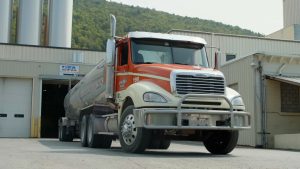
In its response to the petition for rulemaking filed by 22 advocacy groups last August, agency officials acknowledged dairies are likely a significant source of ammonia emissions and may be contributing to visibility degradation in the Columbia Gorge.
But, the officials said, the agency does not have funding to implement the proposed regulatory program. And it’s unclear how emissions from individual farms would be quantified, they said.
The Oregon Environmental Quality Commission is scheduled to vote on the petition Wednesday. It could deny the petition, grant it or choose to do something else.
Food & Water Watch, the lead petitioner, was not immediately available to comment.
Dairy pollution
The groups that signed on to the petition represent environmental, public health, sustainable agriculture, animal welfare and community interests.
They are: 350 Eugene, 350 Deschutes, Animal Legal Defense Fund, American Society for the Prevention of Cruelty to Animals, Beyond Toxics, Center for Biological Diversity, Center for Food Safety, Columbia Riverkeeper, Comunidades Amplifying Voices for Environmental and Social Justice, Environment Oregon, Humane Voters Oregon, Farm Forward, Farm Sanctuary, Food & Water Watch, Friends of the Columbia Gorge, Friends of Family Farmers, Mercy for Animals, Northwest Environmental Defense Center, Oregon Physicians for Social Responsibility, Pendleton Community Action Alliance, Public Justice Foundation and World Animal Protection.
Dairy pollution
The groups that signed on to the petition represent environmental, public health, sustainable agriculture, animal welfare and community interests.
They are: 350 Eugene, 350 Deschutes, Animal Legal Defense Fund, American Society for the Prevention of Cruelty to Animals, Beyond Toxics, Center for Biological Diversity, Center for Food Safety, Columbia Riverkeeper, Comunidades Amplifying Voices for Environmental and Social Justice, Environment Oregon, Humane Voters Oregon, Farm Forward, Farm Sanctuary, Food & Water Watch, Friends of the Columbia Gorge, Friends of Family Farmers, Mercy for Animals, Northwest Environmental Defense Center, Oregon Physicians for Social Responsibility, Pendleton Community Action Alliance, Public Justice Foundation and World Animal Protection.
In Oregon, large dairies are disproportionately located in poor, rural areas, exacerbating health impacts in those communities, DEQ said in its response to the petition.
Advocacy groups’ proposal
Under the proposed rule, regulations would apply to dairies with 700 or more mature cows. DEQ estimates that’s about 45 of the state’s 230 dairies.
Those include six in Marion County (De Jager Dairy, AJ Dairy, Hesse & Sons Dairy, Platt’s Turner Dairy, BSP and Hazenberg Dairy); three in Polk County (Diamond Valley Dairy, Platt’s Oak Hill Dairy and Rickreall Dairy); and two in Lane County (Lochmead Farms and Brownsville Calf Ranch).
New dairies, as well as dairy expansions or modifications, would need to obtain an air quality permit before beginning construction. Existing dairies would have one year to obtain a permit.
Permits would require that, if certain emissions were exceeded, the dairy would have to take steps to achieve reductions. Those could include things like covering manure lagoons, applying liquid manure to fields with low, rather than high pressure systems, or keeping manure in dry, rather than liquid form.
Similar proposals have been floated for at least 15 years.
In 2007, the Oregon Legislature passed Senate Bill 235, directing DEQ to enter into an agreement with the state Department of Agriculture to address the administration and enforcement of air quality laws applicable to agricultural operations. DEQ delegates its authority to regulate dairies to ODA.
DEQ has not yet entered into that agreement.
The bill also created the Oregon Dairy Air Quality Task Force to study the issue and make recommendations. Its report, published in 2008, explicitly called for DEQ and ODA to create a program to conduct further research and create interim regulatory measures for dairy air emissions.
But the Legislature never funded that program.
The Legislature debated further bills that would regulate dairy emissions in 2017 and 2019, but none passed.
Support and opposition
DEQ received 1,649 public comments on the proposal. Of those, 1,578 supported the proposed regulations, 58 opposed them, and 13 comments were neutral.
Among those opposing the proposal were the Oregon Dairy Farmers Association and Threemile Canyon Farms, the state’s largest dairy.
Both argued DEQ does not have statutory authority to regulate air emissions from dairy farms.
DEQ’s analysis, however, concluded the agency does have that authority.
Oregon legislators also weighed in.
“Especially because the federal government has been slow to act on this industry’s climate pollution and its disproportionate impact to environmental justice communities, the state agencies must take up the mantel of environmental and public health protection and grant the petition,” a group of nine legislators supporting the proposal said.
Nineteen lawmakers opposed to the petition wrote, “Oregon’s dairy farms are critically important, not only to many of our legislative districts, but also to the state, providing $9.73 billion in total economic impact amounting to 3.8% of Oregon’s GDP.”
DEQ’s request
In its response to the petition, DEQ said it could be open to a regulatory program in the future if the Legislature provides funding to design and implement such a program.
It also recommended waiting for the federal government to develop a methodology for estimating air emissions from large animal operations.
The U.S. Environmental Protection Agency has been attempting to develop such a methodology since 2001. In June, EPA published draft emissions estimating models for some pollutants. The agency said it expects to finalize the models in late 2023 or early 2024.























